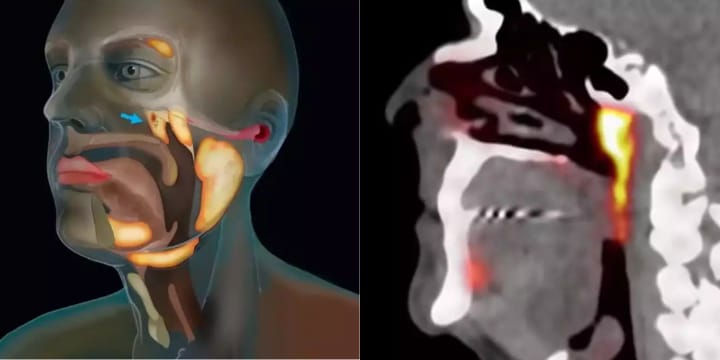Scientists in the Netherlands who were studying prostate cancer accidentally discovered a new organ in the human body. Researchers at the Netherlands Cancer Institute named the previously unseen organ the “tubarial salivary glands.” Pretty cool, eh?
The NCI took CT and PET scans on patients to study tumors.
The patients in question had been injected with radioactive glucose that lights up tumors on scans. However, as they studied the scans, they saw something a little strange.
There were two areas in patients’ heads that were lighting up, suggesting that there were salivary glands in the area. With a little more digging (figuratively speaking, of course), they found the organ which was previously undiscovered.
The tubarial salivary glands are located behind the nose.
How could it have been there for so long without anyone knowing? Well, it just so happens to be nestled in the little nook where the nasal cavity and throat meet, so it’s not all that easy to see.
The organ exists to “lubricate and moisten the area of the throat behind the nose and mouth.” In other words, just because we didn’t know about it previously doesn’t mean it doesn’t have a very important job.
Want a partner? Attract love with the power of your mind.
Sweetn is a new research-based startup that shows you how to call love into your life with the power of your mind. Take our quiz, and try our tools—they can transform your energy and your love life in a few weeks. Just click here.
It takes “very sensitive imaging” to see the organ.
According to Dr. Wouter Vogel, a radiation oncologist at the Netherlands Cancer Institute, the kind of imaging that would highlight that specific area isn’t all that common since it’s “very sensitive” and the tubarial salivary gland is “not very accessible.”
He explained further: “People have three sets of large salivary glands, but not there.
“As far as we knew, the only salivary or mucous glands in the nasopharynx are microscopically small, and up to 1,000 are evenly spread out throughout the mucosa. So, imagine our surprise when we found these.”
Scientists hope the discovery will help cancer patients receiving treatment.
In particular, they hope to smooth out the radiotherapy process since they believe a lot of the complications patients experience are connected to the tubarial salivary glands.
They now plan to look into how to avoid damaging the organ during treatment since a “single misdirected zap” could damage it irreparably, per Vogel.



